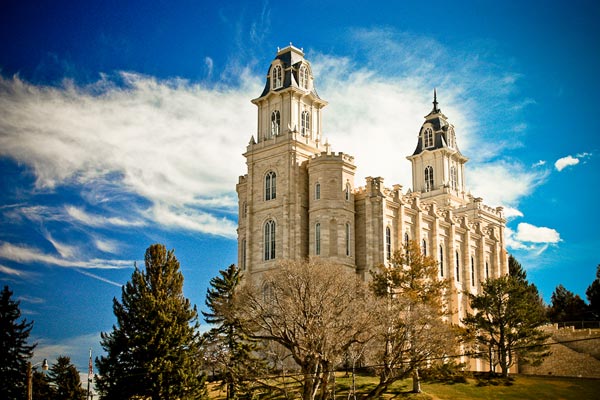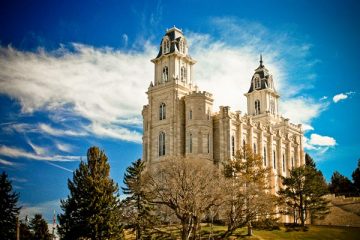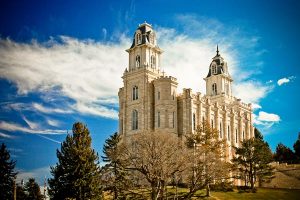Descent blogs at http://jenneology.blogspot.
When I first joined the church in 2001, Gordon B. Hinckley was president of the church and there were 114 temples in operation. Since that time, I have personally been able to attend the open houses for Sacramento and Vancouver, BC as well as the dedication ceremony for Nauvoo. The manual relates the story of how President Hinckley took the church from 31 temples across the world at the time of appointment as prophet to 124 at the time of his death.
Class Dynamics and Mini Temples
President Hinckley was quite aware of the financial disparities that exist between affluent church members and those living in developing countries, rural or under-resourced locations. He described church members’ circumstances thusly:
There are many areas of the Church that are remote, where the membership is small and not likely to grow very much in the near future. Are those who live in these places to be denied forever the blessings of the temple ordinances?
The Church could build [many smaller] temples for the cost of the Washington temple [then under construction]. It would take the temples to the people instead of having the people travel great distances to get to them.
I have been with many who have very little of this world’s goods. But they have in their hearts a great burning faith concerning this latter-day work. They love the Church. They love the gospel. They love the Lord and want to do His will. They are paying their tithing, modest as it is. They make tremendous sacrifices to visit the temples. They travel for days at a time in cheap buses and on old boats. They save their money and do without to make it all possible…
They need nearby temples—small, beautiful, serviceable temples..
Building what became known as Mini Temples can be interpreted as an attempt to democratize temple worship.
The church was able to realize his goal of 100 temples by the year 2000 and at the time of his death in 2008, 124 temples were in operation. He did just as he said he would: “…I hope to end out my days building temples of the Lord, taking the temples to the people…”
Trivia Question for the class:
Can someone tell me how many temples are currently in operation?
Personal Testimony:
I personally believe that President Hinckley’s awareness of poverty and class issues as they relate to temple worship was an important step in the creation of the 4th mission of the church, which was announced in 2009, soon after President Monson succeeded President Hinckley. My testimony of Christ and the scriptures was strengthened when I heard the announcement that the church would make caring for the poor and the needy a central focus of the church. Throughout the scriptures, prophets and Christ himself teaches the importance of Christian charity for the poor and needy. It makes perfect sense for the latter-day church to name it as a primary mission of the church.
Discussion Question:
How do temples help members of the church address the missions of the church? (Remember: At the time of his death there were 3 central missions of the church)
The manual then goes on to categorize President Hinckley’s on temples, which align quite well with the 3-fold mission of the church.
Temples: Perfect the Saints
Include words of female leaders or personal thoughts to supplement President Hinckley’s words from the manual.
President Bonnie D Parkin talked about the power of temple covenants to further our eternal progression.
Covenants—or binding promises between us and Heavenly Father—are essential for our eternal progression. Step-by-step, He tutors us to become like Him by enlisting us in His work. At baptism we covenant to love Him with all our hearts and love our sisters and brothers as ourselves. In the temple we further covenant to be obedient, selfless, faithful, honorable, charitable. We covenant to make sacrifices and consecrate all that we have. Forged through priesthood authority, our kept covenants bring blessings to fill our cups to overflowing. How often do you reflect that your covenants reach beyond mortality and connect you to the Divine?
Making covenants is the expression of a willing heart; keeping covenants, the expression of a faithful heart.
Ask class members to take a moment to reflect on her question. It may have been a rhetorical question but it was one meant for us to reflect. Invite class members to share if they feel so moved.
Temples: Redeem the Dead
Include words of female leaders or personal thoughts to supplement President Hinckley’s words from the manual.
Susan Tanner, 2008: “My Soul Delighteth in the Things of the Lord”:
I delight in priesthood keys and temples that dot the earth, making available to each of us eternal ordinances and covenants. Some of my most celestial days recently have been my own children’s temple marriages, with my father performing that holy ordinance. I delight in the strength of youth as I see them throng the temples to do baptisms for the dead. I love their worthy adherence to the standards leading to the temple and their preparation to be faithful missionaries and righteous mothers and fathers. I delight that I am a daughter of Heavenly Father, who loves me.
Silvia Allred, 2008: “Holy Temples, Sacred Covenants”:
We have been instructed to build temples so that holy ordinances may be performed for both the living and the dead. These ordinances include initiatory ordinances, endowments, marriages, sealings, baptisms for the dead, and ordinations. The initiatory ordinances provide us with specific immediate and future blessings. The endowment embodies sacred covenants. It includes receiving instruction, power from on high, and the promise of blessings on condition of our faithfulness to the covenants we make.
Temples: Proclaim the Gospel
How do temples serve to proclaim the gospel?
- Answers might include:
- Visitors centers
- Beacons to the world
- Symbol of our faith
- Personal anecdotes
The Oakland Temple in California is one well-known example of how temples act like a beacon, sparking interest in people living in and visiting the surrounding communities. From the article “Visible as a Beacon”:
Sister Gloria Lavender and her husband, George, are serving a mission in the Oakland Temple Visitors’ Center. The views of the bay from the temple grounds at sundown are beautiful, she said.
“People here call it the castle on the hill. You can see it from all over,” Sister Lavender said. “It brings a lot of people here because they see it and want to know what it is.”
Elder Lynn Poulsen, director of the Oakland Temple Visitors Center, agreed.
“It’s a beacon on the hill, an invitation to every one of us to come closer to the Savior.”
Blessings of Temple Service:
“Everything that occurs in [the] temple is of an uplifting and ennobling kind. It speaks of life here and life beyond the grave. It speaks of the importance of the individual as a child of God.” –manual quote
Discussion Question:
What would you say to a woman in the church who finds aspects of the temple troubling and disempowering?
What are some of the aspects of the temple that some women in the church find troubling?
How does the temple testify to you your importance as a child of God?
For those who struggle with the temple, perhaps some of President Hinckley’s council in the manual can be helpful. He suggests:
Go to the house of the Lord and there feel of His Spirit and commune with Him and you will know a peace that you will find nowhere else.
In times of darkness, try to get to the house of the Lord and there shut out the world. Receive His holy ordinances, and extend these to your forebears. At the conclusion of a session in the temple, sit quietly in the celestial room and ponder the blessings you have received in your own behalf or that you have extended to those who have gone beyond.
Also, remember, that it is in the celestial room that we are symbolically in the presence of Deity. Neil A Maxwell taught, “When we return to our real home, it will be with the ‘mutual approbation’ of those who reign in the ‘royal courts’ on high.” There we will find beauty such as ‘mortal eye hath not seen;’ we will hear sounds of surpassing music which mortal ‘ear hath not heard.’ Could such a royal homecoming be possible without the anticipatory arrangements of a Heavenly Mother? Meanwhile, there are no separate paths back to that heavenly home.
Closing:
Invite members of your class to utilize the temple and other sacred places for prayer and seeking guidance or answers to questions that weigh heavily on their souls.
*****************
Resources:






